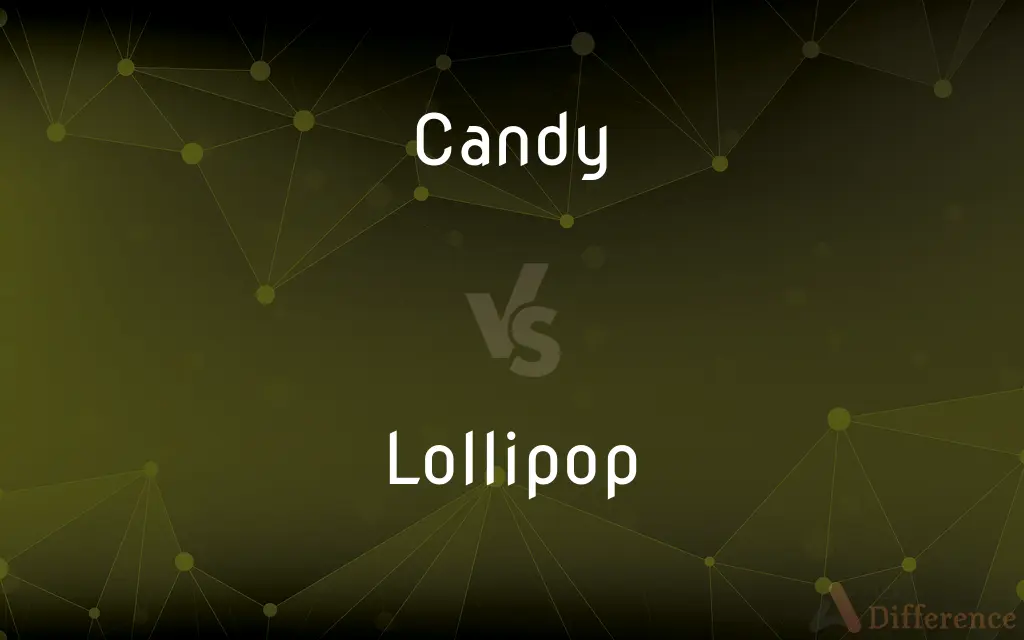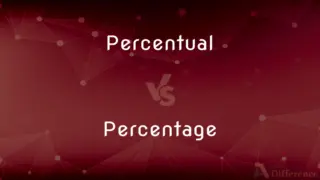Candy vs. Lollipop — What's the Difference?
By Fiza Rafique & Maham Liaqat — Updated on March 18, 2024
Candy encompasses a wide variety of sweet confections, while lollipop specifically refers to a sweet candy on a stick.

Difference Between Candy and Lollipop
Table of Contents
ADVERTISEMENT
Key Differences
Candy is a broad term that includes any sweet confection made from sugar, chocolate, nuts, fruits, and other flavors. Lollipops, on the other hand, are a specific type of candy consisting of flavored sugar candy mounted on a stick for licking or sucking.
Candies come in various forms such as chocolates, gummies, hard candies, and toffees, offering a range of textures from soft to hard. Lollipops are primarily hard candies, designed to dissolve slowly in the mouth, and are recognizable by their stick handle, making them distinct in the candy category.
The manufacturing process of candy varies widely, depending on its type, from simple sugar boiling to complex chocolate tempering. Lollipop production specifically involves boiling sugar syrup, flavoring it, shaping it around a stick, and allowing it to harden.
Candy consumption can be tailored to personal preferences and dietary restrictions, with options ranging from sugar-free to vegan. Lollipops, while also available in various flavors and some dietary adaptations, are generally enjoyed for their long-lasting flavor experience.
Candies serve multiple purposes, from being used in baking decorations to being given as gifts. Lollipops are particularly popular as party favors, in decorative bouquets, or as a treat that's easy to hold and enjoy without making a mess.
ADVERTISEMENT
Comparison Chart
Definition
Sweet confections made from sugar and flavors.
Sweet, flavored sugar candy on a stick.
Forms
Chocolates, gummies, hard candies, toffees.
Primarily hard candy.
Manufacturing
Varies widely, from boiling to tempering.
Involves boiling sugar syrup, shaping, and cooling.
Dietary Options
Broad, including sugar-free and vegan.
Available, but more limited compared to candies.
Usage
Baking decorations, gifts, snacks.
Party favors, decorative bouquets, treats.
Compare with Definitions
Candy
Offers a wide range of textures.
His favorite candy had a soft, chewy texture.
Lollipop
Production involves a specific process.
Making a lollipop requires precise temperature control of the sugar syrup.
Candy
Variety accommodates many dietary needs.
The shop specialized in vegan and sugar-free candies.
Lollipop
Primarily hard and designed for sucking.
The lollipop lasted a long time, slowly dissolving in the mouth.
Candy
Consumed directly or used in recipes.
She used crushed candy for the dessert topping.
Lollipop
Often used as a convenient, no-mess treat.
Lollipops are ideal for young children because they're easy to hold.
Candy
A general term for sweet treats.
She filled the bowl with a variety of candy for the party.
Lollipop
Comes in many flavors, sometimes with fillings.
The gourmet lollipop had a surprise chocolate filling.
Candy
Can include ingredients like nuts or chocolate.
The artisan candy featured premium nuts and dark chocolate.
Lollipop
Candy on a stick.
The child enjoyed a cherry-flavored lollipop.
Candy
Candy, also called sweets (British English) or lollies (Australian English, New Zealand English), is a confection that features sugar as a principal ingredient. The category, called sugar confectionery, encompasses any sweet confection, including chocolate, chewing gum, and sugar candy.
Lollipop
A lollipop is a type of sugar candy usually consisting of hard candy mounted on a stick and intended for sucking or licking. Different informal terms are used in different places, including lolly, sucker, sticky-pop, etc.
Candy
A rich sweet confection made with sugar and often flavored or combined with fruits or nuts.
Lollipop
A confection consisting of a piece of hard candy attached to the end of a small stick.
Candy
A piece of such a confection.
Lollipop
An item of confectionery consisting of a piece of candy/sweet attached to a stick.
Candy
(Slang) An illicit drug, especially one, such as cocaine, that has a sugary appearance or a drug in pill form, such as MDMA.
Lollipop
Something having the shape of a lollipop: a linear stem connected to a round body.
Candy
To cook, preserve, saturate, or coat with sugar or syrup
Candy apples.
Candy ginger.
Lollipop
A kind of sugar confection which dissolves easily in the mouth.
Candy
Edible, sweet-tasting confectionery containing sugar, or sometimes artificial sweeteners, and often flavored with fruit, chocolate, nuts, herbs and spices, or artificial flavors.
Lollipop
A piece of hard candy, often of discoid shape, attached to the end of a handle of wood or hard paper by which it is held in the hand while being licked; - it is popular with small children.
Candy
A piece of confectionery of this kind.
Lollipop
Ice cream or water ice on a small wooden stick;
In England a popsicle is called an ice lolly
Candy
Crack cocaine.
Lollipop
Hard candy on a stick
Candy
(uncountable) An accessory (bracelet, etc.) made from pony beads, associated with the rave scene.
Candy kid; candy raver
Candy
(obsolete) A unit of mass used in southern India, equal to twenty maunds, roughly equal to 500 pounds avoirdupois but varying locally.
Candy
(cooking) To cook in, or coat with, sugar syrup.
Candy
(intransitive) To have sugar crystals form in or on.
Fruits preserved in sugar candy after a time.
Candy
(intransitive) To be formed into candy; to solidify in a candylike form or mass.
Candy
To conserve or boil in sugar; as, to candy fruits; to candy ginger.
Candy
To make sugar crystals of or in; to form into a mass resembling candy; as, to candy sirup.
Candy
To incrust with sugar or with candy, or with that which resembles sugar or candy.
Those frosts that winter bringsWhich candy every green.
Candy
To have sugar crystals form in or on; as, fruits preserved in sugar candy after a time.
Candy
To be formed into candy; to solidify in a candylike form or mass.
Candy
Any sweet, more or less solid article of confectionery, especially those prepared in small bite-sized pieces or small bars, having a wide variety of shapes, consistencies, and flavors, and manufactured in a variety of ways. It is often flavored or colored, or covered with chocolate, and sometimes contains fruit, nuts, etc.; it is often made by boiling sugar or molasses to the desired consistency, and than crystallizing, molding, or working in the required shape. Other types may consist primarily of chocolate or a sweetened gelatin. The term may be applied to a single piece of such confection or to the substance of which it is composed.
Candy
Cocaine.
Candy
A weight, at Madras 500 pounds, at Bombay 560 pounds.
Candy
A rich sweet made of flavored sugar and often combined with fruit or nuts
Candy
Coat with something sweet, such as a hard sugar glaze
Common Curiosities
Are all lollipops hard candy?
Yes, most lollipops are hard candies, though some may have soft centers.
What defines candy?
Candy is a broad category of sweet confections made with sugar and various flavorings.
Do candies come in sugar-free options?
Yes, there are sugar-free candies catering to dietary restrictions.
Can candy be healthy?
While primarily sugary, some candies are made with healthier ingredients or are sugar-free.
What are common uses for candy?
Candy is used for snacking, in desserts, as gifts, and decorations.
How is a lollipop different from other candies?
A lollipop is a type of hard candy attached to a stick.
How are lollipops made?
Lollipops are made by boiling sugar syrup, adding flavor, shaping around a stick, and cooling.
Can lollipops have chocolate?
Yes, some lollipops have chocolate or other fillings.
Why are lollipops popular at parties?
They're easy to distribute, enjoy without mess, and can be decorative.
Is chocolate considered candy?
Yes, chocolate is a type of candy, especially when combined with other ingredients.
Share Your Discovery

Previous Comparison
Homegroup vs. Workgroup
Next Comparison
Percentual vs. PercentageAuthor Spotlight
Written by
Fiza RafiqueFiza Rafique is a skilled content writer at AskDifference.com, where she meticulously refines and enhances written pieces. Drawing from her vast editorial expertise, Fiza ensures clarity, accuracy, and precision in every article. Passionate about language, she continually seeks to elevate the quality of content for readers worldwide.
Co-written by
Maham Liaqat














































